![]()
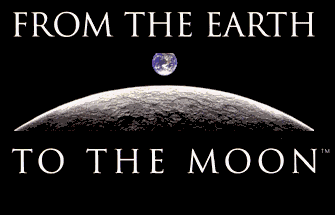
Introduction ¦ Episode Guide With Cast List ¦ Further Information
In 1998, HBO Films in conjunction with Tom Hanks's production company, presented a 12-part mini-series about America's man-on-the-moon program, initiated in 1961 by President John F. Kennedy's challenge to the American people in response to the Soviet Union's swiftly-progressing space program. The result was a stunning epic which garnered a 1998 Emmy Award for Best Mini-Series.
One of the novelties of the production was that, instead of the whole being written and scored by the same people, with the same point of view throughout, each part was done to an individual theme, assigned to different scriptwriters, and the music was done by four different composers. The different points of view made the total project more interesting and each part unique.
Below each episode title is not only a description of the episode and also sequences and characterizations of note, but remarks about the outstanding score. One disappointment to anyone who watched the series and enjoyed the music was HBO's release of a highly unimaginative soundtrack album. While the magnificent, majestic opening and closing theme was represented, the remainder of the original score was ignored in favor of the pop tunes that give the production a sense of the era in which the events took place. While they were appropriate within the individual episodes, they were unwelcome on an album that should have featured the original series scores prominently or indeed totally.
Link to Mason Daring's web site and film/television credits.
Scroll down for From the Earth to the Moon and click on one of the two "D" symbols.
The first "D" is the astronaut theme from "Spider," the second music from "That's All There Is."
Thanks to Mike Okuda for the link!
Since I was born a scant two years before Sputnik, I experienced most of the space program first-hand on TV and have included some personal comments. You can take 'em or leave 'em--I don't mind.
Episode Guide and Cast List
"Can We Do This?" ¦ "Apollo One" ¦ "We Have Cleared the Tower"
"1968" ¦ "Spider" ¦ "Mare Tranquilatis"
"That's All There Is" ¦ "We Interrupt This Program" ¦ "For Miles and Miles"
"Galileo Was Right" ¦ "The Original Wives Club" ¦ "Le Voyage Dans La Lune"
Based in part on A Man in the Moon by Andrew Chaikin.
Producers: Brian Grazer, Ron Howard, Michael Bostick.
Executive Producer: Tom Hanks.
Part One: "Can We Do This?"
Written by Steven Katz
Directed by Tom Hanks
Music by Michael Kamen
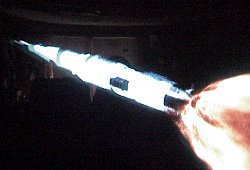 A prelude to Apollo, following the beginnings of the manned space race which began with Sputnik, but greatly accelerated after Yuri Gagarin's launch with fears of a "Red Moon," including the flight of Freedom 7, the choice of nine new astronauts to follow the "Original Seven," significant Gemini missions (Ed White's successful spacewalk and the near tragedy of Gemini 8), the fatal jet crash of Bassett and See, and the problems of NASA actually conceiving the mission objectives to send a man to the moon (an almost impossible list).
A prelude to Apollo, following the beginnings of the manned space race which began with Sputnik, but greatly accelerated after Yuri Gagarin's launch with fears of a "Red Moon," including the flight of Freedom 7, the choice of nine new astronauts to follow the "Original Seven," significant Gemini missions (Ed White's successful spacewalk and the near tragedy of Gemini 8), the fatal jet crash of Bassett and See, and the problems of NASA actually conceiving the mission objectives to send a man to the moon (an almost impossible list).
Of Note: Chris Kraft's listing of the things that had to be accomplished before sending up a moon mission, the "secret meeting" of the "New Nine" under the code name "Max Peck," Ed White's breathtaking space walk, the Woody Woodpecker cartoons used to illustrate aspects of the space program, and the closing scene of Buzz Aldrin's spacewalk.
The character of Emmett Seaborn, part Walter Cronkite and part Jules Bergman, is introduced (and sponsored by Tang) on the fictional NTC network. He lends a loose tie to the twelve series episode, as does Nick Searcy's appearance as grounded astronaut Deke Slayton. Also, each character is played by the same actors in all parts, with the exception being in this first episode, where Peter Scolari plays Pete Conrad. In later episodes, Conrad is played by Paul McCrane.
Musical Notes: Excellent, stirring version of the main title theme accompanying Shepard's flight and splashdown and closing the program, plus the ominous "crisis" music for the Gemini 8 flight.
CAST:
Frank Borman: David Andrews
Hugh Dryden: George Bartenieff
Gavin O'Rourke: Robert Curtis Brown
Bill Anders: Robert John Burke
"Meet the Press" Host: Andrew Chaikin
Hotel Clerk: Kelly Collins
Businessman: David Cooper
Edwin Aldrin: Bryan Cranston
Dave Scott: Brett Cullen
Jim Lovell: Tim Daly
Engineer Two: James Detmar
BOOSTER: Cullen Douglas
Michael Collins: Cary Elwes
Jerome Weisner: Al Franken
Ted Sorenson: Jack Gilpin
Neil Armstrong: Tony Goldwyn
Thomas Stafford: Steven Hofvendahl
Teacher: Mary Thompson Hunt
Ed White: Chris Isaak
Gene Cernan: Daniel Hugh Kelly
Walt Cunningham: Fredric Lane
James Webb: Dan Lauria
C.C. Williams: Jim Leavy
Alan Shepard: Ted Levine
Engineer One: Lamont Lofton
Bob Gilruth: John Carrol Lynch
Roger Chaffee: Ben Marley
Miss Hedges: Deborah May
Donn Eisele: John Mese
Rusty Schweickart: Kieran Mulroney
Chamber President: Greg Neff
David Bell: Tom Nowicki
Screaming Woman: Terry Odem
James McDivitt: Conor O'Farrell
John Hodge: Jim Piddock
SURGEON: Mike Pniewski
John Young: John Posey
PROCEDURES: David Preuss
ECOM: Robert Quinn
RECOVERY: Steven Raulerson
Gus Grissom: Mark Rolston
Christ Kraft: Stephen Root
Press Rep: Linwood Sasser
Pete Conrad: Peter Scolari
Deke Slayton: Nick Searcy
Emmett Seaborn: Lane Smith
Hotel Manager: Hank Stone
Staff Member: Bruce Taylor
Dick Gordon: Tom Verica
FIDO: John Wickersham
VIP: Ralph Wilcox
Shrevesportian: Rich Williams
Elliot See: Steve Zahn
Personal Notes: "Cable in the classroom" wasn't even a dream when they used to trundle a 19-inch black and white television atop a metal cart into our schoolrooms back in the early 1960s. When TV was employed, mostly we watched static lecturers in front of chalkboards on what was then called "NET" (National Educational Television, now PBS). But one memorable February in 1962, we watched openmouthed as Friendship 7 made three orbits around the earth. I was fascinated watching each and every manned spaceflight mission. Several times I feigned illness to stay home from school to watch the TV coverage. Most people watched CBS, it seems, when you see these space retrospectives, but we were NBC watchers in our house, and my memories were of Frank McGee and John Chancellor covering the launches and missions. Coverage in the Apollo years was sponsored by Gulf Oil, and I vividly remember one of their commercials, shots of a massive oil tanker at sea accompanied by an Irish-sounding sea chantey singing about "Sailin' into Bantry Bay, bringin' home the oil."
Part Two: "Apollo One"
Written by Graham Yost
Directed by David Frankel
Music by Mark Mancina
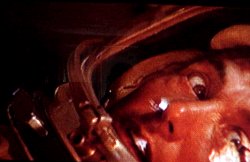 The disastrous fire that killed Gus Grissom, Roger Chaffee, and Ed White in the 1967 plugs-out test is the subject of part two. After the glitch-ridden spacecraft catches fire, the investigative committee endures the fault-finding between NASA and the North American Aviation Company, builder of the command module, focusing mainly on the conflict between Apollo Spacecraft Manager Joe Shea and North American's Harrison "Stormy" Storms, and the resulting Congressional hearings headed by Walter Mondale, who considered the space program a waste of time and money.
The disastrous fire that killed Gus Grissom, Roger Chaffee, and Ed White in the 1967 plugs-out test is the subject of part two. After the glitch-ridden spacecraft catches fire, the investigative committee endures the fault-finding between NASA and the North American Aviation Company, builder of the command module, focusing mainly on the conflict between Apollo Spacecraft Manager Joe Shea and North American's Harrison "Stormy" Storms, and the resulting Congressional hearings headed by Walter Mondale, who considered the space program a waste of time and money.
Of Note: The tie-in between the Pat White scene in this episode and "The Original Wives Club," reaction to Joe Shea's continued assertion that he should have been in the capsule (and his reasoning behind it), nice use of black and white for the flashback sequences, Kevin Pollak and James Rebhorn's performances as Joe Shea and Harrison Storms, Frank Borman's testimony to the committee, the recreation of the spacecraft fire.
Musical Notes: An appropriately somber score for the subject matter, the main theme highlighted in the opening scenes of the dismantling of the capsule.
CAST:
Clinton Anderson: Mason Adams
Pat White: Jo Anderson
Frank Borman: David Andrews
Engineer: Peter Anthony
Secretary #2: Donna Badger
Senator Margaret Chase Smith: Janis Benson
Mondale's Aide: Dan Bright
Simpkinson: Tommy Canary
Pyro Technician: Bill Cordell
Lee Atwood: Ronny Cox
Jan Armstrong: Ann Cusack
Pyro Engineer: Keith Dickerson
Senator Stephen Young: J. Don Ferguson
Robert Seamans: Dann Florek
Storms' Secretary: Ru Flynn
Harrison Storms Jr: Don Fowler
Martha Chaffee: Rhoda Griffin
Skip Chauvin: J. Michael Hunter
Ed White: Chris Isaak
Technician: Tom Kouchalakon
Bud Mahurin: Mitchell Laurence
James Webb: Dan Lauria
Sam Beddingfield: David Lenthall
Roger Chaffee: Ben Marley
Dr. Floyd Thompson: Dakin Matthews
Stu Roosa: George Newbern
George Low: Holmes Osborne
Joe Shea: Kevin Pollak
Phyllis Storms: Robby Preddy
Dr. Berry: Kevin Rainsberger
Harrison Storms: James Rebhorn
Betty Grissom: Ruth Reid
Gus Grissom: Mark Rolston
Chris Kraft: Stephen Root
Deke Slayton: Nick Searcy
Levine: Frank Silva
Walter Mondale: John Slattery
George Mueller: Joe Spano
Astronaut Wife: Kristin Stone
Dr. Robert Van Dolah: Arthur Tanier
Shea's Secretary: Kathy Tyrell
Part Three: "We Have Cleared the Tower"
Written by Remi Aubuchon
Directed by Lili Fini Zanuck
Music by Mark Isham
Following the Congressional hearings, the Apollo program struggles to get back on track. A documentary team is shown filming a story about the Apollo 7 mission, interviewing everyone from the Mission Control team to nurse Dee O'Hara to Guenter Wendt, the Launch Pad director, to, of course, the crew, which is followed through emergency aborts and sober discussion about the needed success of the mission after the fire.
Of Note: The use of grainy stock to represent the documentary team's film, Max Wright's delightful portrayal of Guenter Wendt (and the use of the classic "Guenter Wendt" joke).
Musical Notes: Isham's wonderful trumpet theme is a highlight of this episode.
CAST:
Jo Schirra: Krista Adair
Jim Leiws: Jay T. Becker
Concerned Spectator: Virginia Ellen Chappell
Documentary Cameraman: Marcelo Durst
Dr. Fred Kelly: Joe Farago
Russ Lawrence: Lowell Fenner
Skip Chauvin: Keith Graham
Wally Schirra: Mark Harmon
Tech #1: Holland Hayes
Thomas Stafford: Steve Hofvendahl
EVAC Supervisor: George Hoggard
Launch Director: Jay Honeycutt
Documentary Director: Peter Horton
Gene Cernan: Daniel Hugh Kelly
Walt Cunningham: Frederic Lane
Dee O'Hara: Ann Magnuson
Tim Messick: Joshua Malina
Deke's Secretary: Cindy Maranne
Donn Eisele: John Mese
Editor: Mati Moralejo
Nerd #1: Philip Nolen
John Young: John Posey
Clyde Teague: Steve Purnick
Gus Grissom: Mark Rolston
Nerd #2: Steve Sands
Deke Slayton: Nick Searcy
John Healey: Brandon Smith
Curious Spectator: Randy G. Stephens
Guenter Wendt: Max Wright
Part Four: "1968"
Written by Al Reinert
Directed by David Frankel
Music by Michael Kamen
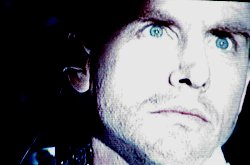 News footage of the tumultuous events of 1968—the Tet Offensive, rioting, the presidential nominating conventions, escalation in Vietnam, the assassinations of Dr. Martin Luther King and Robert Kennedy—are juxtaposed against the continuing efforts of the Apollo program to achieve their moon landing deadline and the successful test of the Saturn 5 rocket and their discovery of a new Soviet rocket. Thus the decision to send Apollo 8 to the moon without the lunar module.
News footage of the tumultuous events of 1968—the Tet Offensive, rioting, the presidential nominating conventions, escalation in Vietnam, the assassinations of Dr. Martin Luther King and Robert Kennedy—are juxtaposed against the continuing efforts of the Apollo program to achieve their moon landing deadline and the successful test of the Saturn 5 rocket and their discovery of a new Soviet rocket. Thus the decision to send Apollo 8 to the moon without the lunar module.
Of Note: News footage (too much, some critics said) delinating the unsettled times, bringing the reality of the end of the decade alive again, the Borman family learning of RFK's death (the Bormans were personal friends), the montage of the launch against the carnage, the use of color to emphasize the majority of the space scenes with black and white mostly used for the ground scenes, the delight in the first Earthrise, the throat-catching reading of Genesis, Michael Collins reading the "You saved 1968" telegram.
Musical Notes: To accompany the times, the music is chiefly sober, growing in hope as Apollo 8 achieves each of its goals.
CAST:
Edwin Borman: Brandon Ambrose
Thomas Paine: Sam Anderson
Frank Borman: David Andrews
Bill Anders: Robert John Burke
CIA #2: Maury Covington
Jim Lovell: Tim Daly
Engineer: Keith Dickerson
NASA Rep.: Steve DuMouchel
Michael Collins: Cary Elwes
Rocco Petrone: Tracy Frenkel
RETRO: David Drew Gallagher
CIA #1: Andrew Heller
William Schneider: Jim Howard
CAPCOM: Steve Howard
Bob Gilruth: John Carroll Lynch
GUIDO: Andy Milder
George Lowe: Holmes Osborne
BBC News Reader: Eric Paisley
SURGEON: Mike Pniewski
EECOM: Robert Quinn
FIDO: Michael Roddy
Chris Kraft: Stephen Root
Deke Slayton: Nick Searcy
Fred Borman: Brain Shields
Flight Director #1: Kurt Smildsin
Emmett Seaborn: Lane Smith
Flight Director #2: Graham Timbes
Kurt Debus: Kristian Truelson
GNC (Telmu): Robert Walker
Julian Bowman: Rick Warner
Wernher Von Braun: Norbert Weisser
FIDO: John Wickersham
Susan Borman: Rita Wilson
George Hage: Steve Zurk
Personal Notes: Ah, well, I was a typical kid--as much as I loved the space program I did complain in my diary about Apolloو interrupting some of my Saturday morning programs! It is odd watching this program and reading the criticisms of "too much news footage." Perhaps the people writing them did not live through 1968. Even at age 12 I, as well as my schoolmates, recognized it as a cataclysmic year full of dangers and sorrow.
Part Five: "Spider"
Written by Andy Wolk
Directed by Graham Yost
Music by Mason Daring
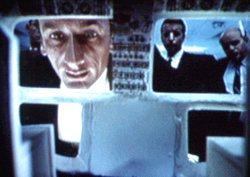 How to get to the moon: many ideas--a few offbeat--are posed, but the two primary ideas are, at first, direct ascent and earth orbit rendezvous. Then an engineer named Tom Dolan proposes a "shuttle" approach, a cause taken up by NASA engineer John Houboult, who fights to have the idea considered. When lunar orbit rendezvous is chosen as the way to go, Grumman Aircraft wins the award to build the lunar module. The remainder of the story follows the building, testing and first flight of the LM.
How to get to the moon: many ideas--a few offbeat--are posed, but the two primary ideas are, at first, direct ascent and earth orbit rendezvous. Then an engineer named Tom Dolan proposes a "shuttle" approach, a cause taken up by NASA engineer John Houboult, who fights to have the idea considered. When lunar orbit rendezvous is chosen as the way to go, Grumman Aircraft wins the award to build the lunar module. The remainder of the story follows the building, testing and first flight of the LM.
Of Note: The SF book opening backed with Barry Gray's "Fireball XL-5" theme, Matt Craven's narration and portrayal of Tom Kelly, the supporting cast including Grant Shaud as Bob, the brainstorming sequence in the design of the LM. The entire story, in fact, is fully of memorable lines and sequences and a good dose of humor. Most reviews of this miniseries cite this as the favorite episode of the series; others that do not rank it up there with the top five.
Musical Notes: "Spider" contains some of the most wonderful music of the series: a mysterious "alien" theme which opens the episode, a jaunty, jazzy "engineering" theme, the lyrical flying theme which occurs again during "Galileo Was Right," and a wistful piano sequence. The integration of the Great Escape theme music is equally delightful.
CAST:
Engineer Bob: Remi Aubuchon
John Houbolt: Reed Birney
Allyn B. Hazard: David Brisbin
Glennan: Max Brown
Tom Kelly: Matt Craven
Dave Scott: Brett Cullen
Kelly's Assistant: Keith Dorman
Mylar Engineer: John Drew
Robert Seamans: Dann Florek
Houbolt's Critic #1: Randell Haynes
Tom Stafford: Steve Hofvendahl
Paul Lucas: Clint Howard
Gene Cernan: Daniel Hugh Kelly
Glennan's Assistant: Paul Kiernan
Young Engineer: Brian LaFontaine
Doubting Engineer: Mark Lainer
Arnold Whitaker: Matthew Lussier
John Coursen: Phillip Martinez
Houbolt's Critic #2: Fred Mooneyham
Rusty Schweickart: Kieran Mulroney
Seaman's Assistant: Dean Napolitano
Colleague #1: Jon Nutten
James McDivitt: Conor O'Farrell
George Low: Holmes Osborne
Colleague #2: Stan Petter
Tom Dolan: Alan Ruck
Deke Slayton: Nick Searcy
Bob Carbee: Grant Shaud
John Rigsby: Russel Warner
Wernher Von Braun: Norbert Weisser
Engineer Dave: Graham Yost
Personal Notes: When I'm depressed these days, my husband usually asks "Do you want to watch 'Spider'? It always helps. Some of the reviews on this have said "Engineering has never been such fun!" and oh, how true! This is a grand episode that manages to get across the grueling trial-and-error work of engineering along with the sheer joy of designing.
Part Six: "Mare Tranquilatis"
Written by Al Reinart and Graham Yost and Tom Hanks
Directed by Frank Marshall
Music by James Newton Howard
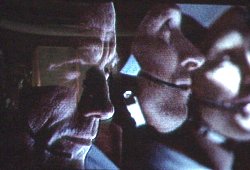 A framing sequence of the Apollo 11 astronauts being interviewed by Emmett Seaborn is interspersed with a chronicle of the first moon landing and the conflicts that went on between Neil Armstrong and Buzz Aldrin in training for the mission, Aldrin in intensity for the significance of the event and Armstrong in simply wanting to do his job.
A framing sequence of the Apollo 11 astronauts being interviewed by Emmett Seaborn is interspersed with a chronicle of the first moon landing and the conflicts that went on between Neil Armstrong and Buzz Aldrin in training for the mission, Aldrin in intensity for the significance of the event and Armstrong in simply wanting to do his job.
Of Note: Bryan Cranston's portrayal of Buzz Aldrin as a man full of doubts and occasional flashes of ego (it seems almost harsh, but according to many other biographies of the time, including Aldrin's own, it appears rather accurate).
Musical Notes: There is a stirring moon landing theme that runs between all segments.
CAST:
Thomas Paine: Sam Anderson
Frank Borman: David Andrews
CONTROL: Roger Bernard
Jan Armstrong: Betsy Brantley
Jack Garman: Tom Brooks
Gene Kranz: Dan Butler
Cameraman: Joe Candelora
Buzz Aldrin: Bryan Cranston
CAPCOM: J. Downing
Michael Collins: Cary Elwes
SURGEON: Timothy A. Franta
RETRO: David Drew Gallegher
Neil Armstrong: Tony Goldwyn
Honeycutt: Dan Hagen
Flight Director: Don Harvey
GNC: Bill Leavy
Pat Collins: Mikki McKeever
TELMU: Timothy McLaughlin
GUIDO: Andy Milder
BOOSTER: Jeffrey Parrish
Back Room Man #2: Michael Rafferty
Back Room Man #1: Roger Ranney
Joan Aldrin: Diana Scarwid
Deke Slayton: Nick Searcy
EE COM: Robert Serwatka
Emmett Seaborn: Lane Smith
Priest: Jack Swanson
FIDE: John Wickersham
Susan Borman: Rita Wilson
Personal Notes: Ironically of the 12 parts, the first moon landing episode is one of the least interesting. Perhaps the producers and writers didn't know what to do to "top" the reality of the actual event. Certainly it would be hard to reproduce the feelings of the public in those too-short mid-July days: in our neighborhood it was time for the St. Mary's Church Feast, a celebration, as all the weekend Catholic church feasts in Rhode Island, with food booths, carnival rides, band concerts, and fireworks on Sunday nights. Usually we would spend that last Sunday night wandering around the feast grounds dribbling the sugar powdered over fragrant "doughboys," sipping Del's Frozen Lemonade, then walking down behind the Cranston Police Station for the fireworks. This Sunday, however, we did cursory attendance and hurried home, like almost everyone else, to stare in wonder at the bluish shadow that was Neil Armstrong step out upon the surface of the moon.
A few days after Apollo 11's splashdown, half the United States seemed to undergo a constant deluge of rain. Elderly people, in dire voices, said it was all due to "those men walking around on the moon disturbing things."
Part Seven: "That's All There Is"
Written by Paul McCudden and Erik Bork and Tom Hanks
Directed by John Turteltaub
Music by Mason Daring
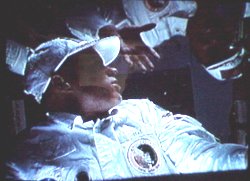 After Apollo 11, the next moon landing had to be an anticlimax—but the crew of Apollo 12 perform their mission with a good-natured attitude that infects this installment. Alan Bean's jaunty narration follows the mission from its ill-starred beginning (lighting having struck the rocket during liftoff) to the successful moonwalk with an unsuccessful camera, interspersed with flashbacks of Bean's friendship with his crewmates Conrad and Gordon and how he won his slot on the mission.
After Apollo 11, the next moon landing had to be an anticlimax—but the crew of Apollo 12 perform their mission with a good-natured attitude that infects this installment. Alan Bean's jaunty narration follows the mission from its ill-starred beginning (lighting having struck the rocket during liftoff) to the successful moonwalk with an unsuccessful camera, interspersed with flashbacks of Bean's friendship with his crewmates Conrad and Gordon and how he won his slot on the mission.
Of Note: Every scene among the three crewmembers, poor Emmett Seaborn's disappointment at the camera malfunction (how representative of those of us in the audience waiting for that moonwalk!), the gaping schoolchildren hearing Conrad's "colorful language," Bean's and Conrad's unorthodox re-entry into Yankee Clipper, Al Bean's wonder at being in space.
Musical Notes: Another great score from Mason Daring, this one fitting the light-hearted narration, a jazzy main theme and accompanying incidental music.
CAST:
Technician: Jeff Breslauer
Gerry Griffin: David Clyde Carr
"Buck" Willoughby: George Colangelo
Alan Bean: Dave Foley
C.C. Williams: Jim Leavy
Roger Chaffee: Ben Marley
Pete Conrad: Paul McCrane
Ed Gibson: Geoffrey Nauffts
Flight Surgeon: Mike Pniewski
Ten Year Old Boy: Shawn Pyfrom
Geologist: Gary Rorman
Emmett Seaborn: Lane Smith
John Aaron: John Travis
Dick Gordon: Tom Verica
Personal Notes: How I laughed when Bean's comments about the Apollo 12 camera fiasco concludes with "hope I didn't disappoint anyone" just as Emmett Seaborn throws his glasses down in disgust. I was one of the disappointed ones, having wangled an "I'm sick" excuse to stay home from school. My mother usually thrust a thermometer in my mouth when I tried this ploy and if I didn't have a fever, out the door I went. This time it worked, though, although I was relegated to bed and had to take aspirin regularly. (I realized later that she was on to me all the time, but I was a good student and she knew I would make up the work I missed that day.) When the screen froze into the unrelenting glare-and-black, I made do with the audio broadcast--it was wonderful nevertheless.
Part Eight: "We Interrupt This Program"
Written by Peter Osterlund and Amy Brooke Baker
Directed by David Frankel
Music by Brad Fiedel
Apollo 13's ill-fated mission as seen from the point of view of the jaded media, whose diminishing interest in the space program is suddenly reawakened by the accident in space. As Emmett Seaborn covers the crisis for the fictional NTC network, the ugly head of exploitative journalism raises its head when young hotshot reporter Brett Hutchins does all he can to get exclusive footage of the astronaut's families and finally ambushes Jack Sweigert's elderly parents—and the network approves of his initiative.
Of Note: Lane Smith's performance as Seaborn. The last cut is the unkindest of all.
Musical Notes: The understated score is appropriate for the subject.
CAST:
Sarah: Tammy Arnold
Joel Kruger: Rus D. Blackwell
Editor: Brian Brightman
Gene Kranz: Dan Butler
Reporter #3: Jack Carroll
Reporter #4: Colette Piceau Colangelo
Doris: Heather DeOreo
Jeff Jordy: Steve DuMouchel
Director: Jeff Evans
Suit #2: Billy Flanigan
Dr. Swigert: Harold Fletcher
Mr. Radio: Tim Goodwin
Brett's Soundman: Erich Hoffelder
Ralph Cooper: John Hostetter
Paul Lucas: Clint Howard
Reporter #5: Key Howard
Hal Deacon: John M. Jackson
Shirley: Kathy Karol
David Gibson: David Kaufman
Seymour Rosen: William Larson
Larry Thompson: Michael Laskin
TV #3: Christopher Miles
Brett Hutchins: Jay Mohr
Reporter #7: Jeff Moldovan
Suit #1: Dennis Neal
TV #1: Don C. Noderer
James McDivitt: Conor O'Farrell
Mrs. Swigert: Janet Peterson
Stanley Craig: Ethan Phillips
Reporter #8: Ric Reitz
Sam Langfitt: Brett Rice
Chris Kraft: Stephen Root
Warren Moburg: John Rothman
Mr. AP: Paul Rouffa
Suit #3: Gerard Russell
Deke Slayton: Nick Searcy
Emmett Seaborn: Lane Smith
TV #4: Catherine Stork
TV #2: Jan Taylor
TV #5: Todd Thomspon
Mr. UPI: Doug Truelson
Reporter #2: Cyndi Vicino
Anchor: Dave Wagner
Reporter #6: George Wilson
Personal Notes: Again, one of the lesser episodes of the series, although watching Emmett Seaborn lose his prominence in the network's greedy desire for explotative material is heartbreaking and infuriating. The mini-series aired very soon after the release and success of Apollo 13, and the producers had to address the disaster without repeating the plot of the film for its audience, which they assumed From the Earth to the Moon would have shared. Thus the "reverse take" on the situation, one which many critics and viewers thought was a bit too hard on the press.
Part Nine: "For Miles and Miles"
Written by Erik Bork
Directed by Gary Fleder
Music by Mark Isahm and Jeff Beal
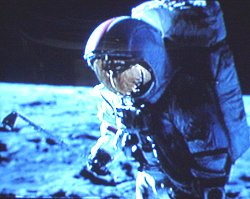 Alan Shepard's journey back into space is chronicled. After he is diagnosed with Meniere's disease, a disabling inner ear disorder, Shepard is pulled from flight rotation (indeed is forbidden to fly any aircraft again for months, then only reinstated with a co-pilot). Reassigned to ground duty, Shepard takes his job as mission coordinator seriously but longs to go back into space—his chance comes when an inner ear surgeon suggests a new procedure. When it's successful, Shepard pushes his way back into flight rotation. Malfunctions in the guidance system prove Shepard's mettle and skill.
Alan Shepard's journey back into space is chronicled. After he is diagnosed with Meniere's disease, a disabling inner ear disorder, Shepard is pulled from flight rotation (indeed is forbidden to fly any aircraft again for months, then only reinstated with a co-pilot). Reassigned to ground duty, Shepard takes his job as mission coordinator seriously but longs to go back into space—his chance comes when an inner ear surgeon suggests a new procedure. When it's successful, Shepard pushes his way back into flight rotation. Malfunctions in the guidance system prove Shepard's mettle and skill.
Of Note: Shepard's secretary posting a photo that accurately reflects his "mood of the day," the nurses who discover his identity during his surgery.
Musical Notes: An alternately jazzy and moody soundtrack, full of horns and woodwinds that appropriately reflect Shepard's personality.
CAST:
Bruce McCoy: Dylan Baker
Fred Haise: Adam Baldwin
Gerry Griffin: David Clyde Carr
Ed Mitchell: Gary Cole
Jim Lovell: Tim Daly
Julie Shepard: Joanna Garcia
Bud: Henderson Gilleland
Ben Taylor: Jerry Hardin
Dick Thorson: Mike Harding
Tom Stafford: Steve Hofvendahl
Don Eyles: Chris Hogan
Laura Shepard: Gwen Hollander
Gene Cernan: Daniel Hugh Kelly
GUIDO: David Kelsey
Anesthesilogist: J. LaRose
Alan Shepard: Ted Levine
Dr. House: Andrew Massett
Stu Roosa: George Newbern
Gaye Alford: Robin O'Dell
Louise Shepard: Kim Ostrenko
Charlie: Jeff Pillars
Scrub Nurse: Caroline Ross
Jules Bergman: Andrew Rubin
Deke Slayton: Nick Searcy
Dick: Tom I. Stearnn
Circulating Nurse: Marty Stonerock
Joan Roosa: Lesa Thurman
L. Gordon Cooper: Robert Treveiler
Julian Bowman: Rick Warner
Alice Shepard: Ashley Ann Wood
Part Ten: "Galileo Was Right"
Written by Jeffrey Fiskin and Remi Aubuchon
Directed by David Carson
Music by Mason Daring
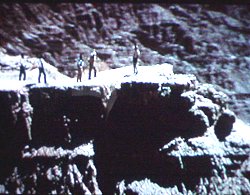 When the later Apollo mission astronauts are required to learn more about geology, Harrison Schmitt requests that the static minerology lectures they have been enduring be replaced with field work teaching the astronauts to be better field observers. Schmitt then talks eminent geology professor Lee Silver into training his compatriots to be field geologists. The men are skeptical, until they fall under Silver's unorthodox spell and the magic of "context." In the meantime, Farouk El-Baz teaches Al Worden how to observe from above.
When the later Apollo mission astronauts are required to learn more about geology, Harrison Schmitt requests that the static minerology lectures they have been enduring be replaced with field work teaching the astronauts to be better field observers. Schmitt then talks eminent geology professor Lee Silver into training his compatriots to be field geologists. The men are skeptical, until they fall under Silver's unorthodox spell and the magic of "context." In the meantime, Farouk El-Baz teaches Al Worden how to observe from above.
Of Note: Jack Schmitt's recruitment of Lee Silver, Silver's attention-grabbing field lecture, El-Baz introduces himself to Worden, Dave Scott falls under Silver's spell, Scott and Irwin get into a "pissing contest," Scott speaks up for exploring beautiful places, the "Galileo was right" experiment.
Musical Notes: Another great score which includes the reprise of the lyrical flying theme used in the second half of "Spider" is heard again.
CAST:
Harrison "Jack" Schmitt: Tom Amandes
Dr. Ray Pemberton: John Aylward
Rocco Petrone: Barry Bell
Gerry Griffin: David Clyde Carr
Lee Silver: David Clennon
Dave Scott: Brett Cullen
Jason: Keith Flippen
Chester Lee: Joe Inscoe
Karl Heinze: Marc Macauley
Joe Allen: Doug McKeon
Blaisdell: Tim Parati
Al Worden: Michael Raynor
Geology Professor: Arland Russell
Deke Slayton: Nick Searcy
Farouk El-Baz: Isa Totah
Dick Gordon: Tom Verica
Jim Irwin: Gareth Williams
Part Eleven: "The Original Wives Club"
Written by Karen Janszen and Tom Hanks and Erik Bork
Directed by Sally Field
Music by Marc Shaiman
The loss of newlywed Ken Mattingly's wedding ring enroute to the moon on Apollo 16 frames a story about the hardships faced by the astronauts' wives. Having been warned to keep all domestic worries away from their husbands so as not to jeopardize their husbands' positions on the flightline and continuing to support each other during crises leads to strain for many of the wives: shy Pat White is uncomfortable with and often terrified by the publicity that surrounds the astronauts, Susan Borman begins drinking heavily, others feel alienated. In the end, death—and divorce—take their toll on the women of the space program.
Of Note: The device of introducing the astronauts' wives during a fashion show (one of the many functions they were asked to participate in as part of their "duties"), the friendship of "the two Pats," the reprise of the notification scene with Jan Armstrong from "Apollo One," actual footage of the moonwalk, Jim Lovell's discovery that his kids had their tonsils out in 1964.
Musical Notes: There is a particularly sweet little motif that opens and closes this episode beginning with Ken Mattingly searching for his missing wedding ring.
CAST:
Pat White: Jo Anderson
Frank Borman: David Andrews
Susan Lovell: Katie Austin
Reporter #48: Robert Catini
Faye Stafford: Wendy Crewson
Jan Armstrong: Ann Cusack
Jim Lovell: Tim Daly
Charlie Duke: J. Dowing
Trudy Cooper: Sally Field
Charlie: Keith Harris
PAO: Jim Helsinger
Master of Ceremonies: John Michael Higgins
Barbara Lovell: Kristie Horton
Reporter #1: Kev Howard
Ken Mattingly: Zeljko Ivanek
Jay Lovell: Elliot Kachnycz
Pat McDivitt: Delane Matthews
Reporter #72: Claudia Miller
Christopher Conrad: John Mountford
Barbara Young: Deidre O'Connell
Marilyn Lovell: Elizabeth Perkins
John Young: John Posey
Marilyn See: Debra Jo Rupp
Jane Conrad: Cynthia Stevenson
L. Gordon Cooper: Robert Treveiler
Marge Slayton: Jobeth Williams
Susan Borman: Rita Wilson
Part Twelve: "Le Voyage Dans La Lune"
Written by Tom Hanks
Directed by Jonathan Mostow
Music by Michael Kamen
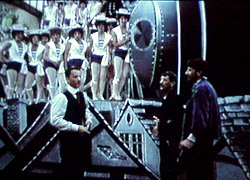 Blythe Danner's otherworldly narration links two moon flights: the final voyage of Apollo 17 juxtaposed against the first on film, made by pioneer film-maker George Melies. Producer Tom Hanks appears in this final part as one of Melies' assistants, who chronicles the conception and filming of Le Voyage Dans La Lune in Melies' turn-of-the-century French movie studio. In the present, Cernan, Schmitt, and their compatriots reminisce about the final Apollo flight and our reasons for going into space.
Blythe Danner's otherworldly narration links two moon flights: the final voyage of Apollo 17 juxtaposed against the first on film, made by pioneer film-maker George Melies. Producer Tom Hanks appears in this final part as one of Melies' assistants, who chronicles the conception and filming of Le Voyage Dans La Lune in Melies' turn-of-the-century French movie studio. In the present, Cernan, Schmitt, and their compatriots reminisce about the final Apollo flight and our reasons for going into space.
Of Note: The painstaking recreation of the "filming" of La Voyage Dans La Lune, Hanks' portrayal of Jean-Luc Despont, Schmitt's discovery that he's going to the moon, Cernan and Schmitt's joyful exploration of the lunar surface, Ed Fendel's perfect track of the ascent stage's liftoff, the closing summaries of the lunar mission results.
Musical Notes: A lush version of the theme plays under the filming of Melies' masterpiece, and different variations of the theme underscore most of the action in this episode.
CAST:
Harrison "Jack" Schmitt: Tom Amandes
Older Sahjid: Bart Braverman
Gerry Griffin: David Clyde Carr
Lee Silver: David Clennon
Narrator: Blythe Danner
Rob Parker: Chris Ellis
Jason: Keith Flippen
Jean-Luc Despont: Tom Hanks
Ed Fendel: George Kapetan
George Melies: Tcheky Karyo
Gene Cernan: Daniel Hugh Kelly
Young Sahjid: Del Spearman
Tracy Cernan: Elizabeth Morehead
Blaisdell: Tim Parati
Special Effects Worker: J.C. Quinn
Geologist: Michael Roddy
Chris Kraft: Stephen Root
Deke Slayton: Nick Searcy
Emmett Seaborn: Lane Smith
Further Information
Web Resources
You can spend days and weeks simply at NASA's website, specifically the NASA Human Spaceflight Program Resources on the More About NASA Astronauts page. There are Mercury and Gemini links and then the following Apollo links:
Other Interesting Websites:
Books
These are only a few of the myriad books out about the space program:
Films
Both ridiculous and sublime...
| From the Earth to the Moon is the property of HBO Original Films, Tom Hanks. This is a fan page. No copyright infringment is intended. Any opinions stated are my own and do not reflect the thoughts of the creators or producers. |